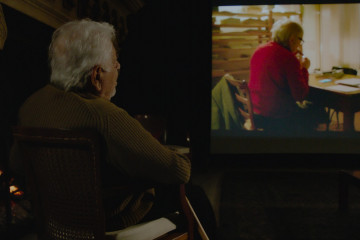

In her latest effort, titled See You Friday, Robinson, Iranian painter and filmmaker Mitra Farahani commits to witness and shoot a long epistolary exchange between two masters of cinema.
The first is French-Swiss director Jean-Luc Godard, today aged 91, one of the pioneers of the 1960s French Nouvelle Vague and arguably one of the most prominent filmmakers of all time.
The second is Shiraz-born director Ebrahim Golestan, who will turn 100 later this year. Probably less known in the Western world than his French counterpart, Golestan has been one of the protagonists of his country’s own New Wave. In Farahani’s documentary, both maestros commit to a 29-week-long email exchange, taking place every Friday.
"From the very beginning, it’s clear that Godard and Golestan are two parallel lines that never meet"
It’s singular the fact that, throughout the decades, these two artists never met or interacted with each other, despite their similar political and artistic paths.
The whole film takes advantage of such aspect and deliberately keeps Golestan and Godard distant from each other. Thus, the pair ends up engaging in an asynchronous dialogue taking place only in writing, with most of the picture set within the premises of the artists’ own residences in Sussex and Rolle, respectively.
This bold choice makes See You Friday, Robinson predictably verbose and sorely lacking in dynamism. It’s true, the charisma and the historical importance of the two subjects make up for these flaws, but only in small part. Most of their talks are self-referential or filled with philosophical and intellectual ramblings.
They seamlessly cover topics such as the meaning of cinema, their relationship with death, Matisse’s oeuvre, James Joyce’s novel Finnegan’s Wake, among others. The numerous digressions are interspersed with the voice-over of the helmer herself, darting in and out to make obscure remarks and conferring a more ‘essayistic’ tone to the whole narrative.
Luckily, Farahani left some room for humour and for the pair to make fun of each other. That’s when the film works best. For example, at some point Golestan states that Godard’s films possess a certain dose of pretentiousness and he argues it is so “because of his Catholic education.”
Throughout, Golestan’s puzzled reactions to his colleague’s cryptic answers are rather pleasant to watch, but they clash with the overly serious tone of Farahani’s voice-over, which slows down the viewing experience, making it more dull and pretentious. In other words, this timid attempt to mix low-brow and eye-brow culture doesn’t quite hit the mark.
Aesthetically speaking, the camera often observes the two subjects very closely, showing in detail the two directors’ residencies – Golestan lives in what looks like an English countryside mansion, whilst Godard spends his days in a small urban apartment.
One of the most remarkable scenes depicts the French master ironing his shirts. This is the type of gaze – both surprising and ironic – which could have helped Farahani to make a more interesting film.
|
Overall, the film’s fragmented structure contributes to deliver a ‘diluted’ piece.
As diluted as the watered down wine Jean-Luc Godard pours himself in the film’s last scene. It’s certainly a missed opportunity, because filming the two veterans of a similar calibre could have offered much more profound, playful material. And perhaps such footage exists, but it’s not included in the final cut.
From the very beginning, it’s clear that Godard and Golestan are “two parallel lines that never meet”, and so does the film claim at some stage.
That being said, such unchangeable status quo reduces See You Friday, Robinson to a long series of vignettes of varying cinematic value, lacking direction and purpose.
On the whole, the picture fails to answer simple, crucial questions such as ‘why was this film made?’, ‘what do Godard, Golestan and Farahani want to tell us?’ and, more importantly, ‘why is it so urgent?’.
In the last third, we may perceive the sudden hospitalisation of Golestan as a turning point, or at least an occasion to dig deeper into the two director’s intimate relationship with death and ageing.
Nevertheless, Farahani doesn’t deviate from her original path. As it stands, this ‘slice of life’ collection of clips may be appealing for hardcore cinephiles, but it will struggle to attract other audience segments.
See You Friday, Robinson was staged by Paris-based studio Écran Noir Productions in co-operation with Swiss, Iranian and Lebanese partners. The feature was world-premiered in the Encounters strand of this year’s Berlin Film Festival (10-20 February 2022), and it will soon play at Nyon’s Visions du Réel, unspooling from 7-17 April.
Davide Abbatescianni is an Italian Film Critic and Journalist based in Cork, Ireland.
Follow him on Twitter: @dabbatescianni





 Follow the Middle East's top stories in English at The New Arab on Google News
Follow the Middle East's top stories in English at The New Arab on Google News


